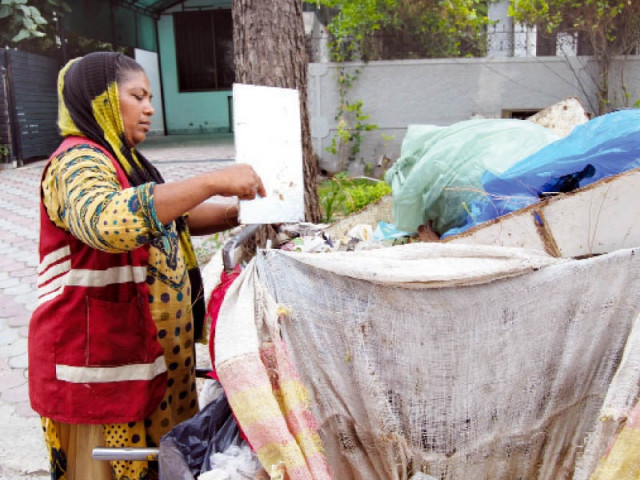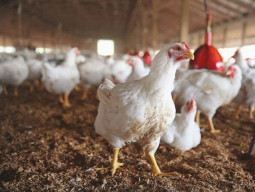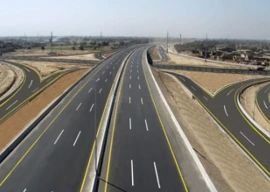
Anwar Khatoon starts her day at dawn. Pushing an overloaded wheelbarrow and gasping for breath, she rings one doorbell after another to collect any garbage for the day. She separates plastic bottles, paper, cardboards, metal pieces and other recyclable items and keeps them in different compartments and bags dangling from her cart.
The 45-year-old has been a Capital Development Authority (CDA) employee since the last two decades. She and her husband, who works as a plumber in the capital, barely make enough to pay their rent and provide for their five children.
“At times I’m asked to work on Sundays --- my only day off --- due to shortage of sanitary staff” said Khatoon, with a melancholy look on her tired face. She feels extremely guilty about not being able to spend enough time with her family due to her long working hours but she cannot afford to leave her job as her husband alone cannot make ends meet. Since both parents are busy earning a livelihood for their children, Khatoon has not enrolled her eldest son in school so he is free to look after his younger siblings while both parents are away at work.
Being a heart patient, Khatoon recalls that she once went to the CDA hospital for treatment where the medical staff was reluctant to treat her. They did not say so, but she believes it was because of her being a Christian.
CDA spokesperson Asim Khichi, while talking to The Express Tribune, said “There was a shortage of sanitary staff due to the hiring freeze imposed by this government which resulted in an additional strain on the existing employees.” He added that once the freeze was over the civic agency would hire the required number of sanitary workers to provide relief to the present staff. However, there were thousands of sanitary workers from various religious backgrounds employed by CDA and they had never been denied treatment based on their beliefs, he added.
“I don’t let my children go out of the house while I’m at work because our basti’s environment is extremely unsafe and socially hazardous,” Khatoon lamented. She added that the growing menace of drug abuse had rendered the streets of her slum extremely vulnerable for growing children.
However, when contacted, CDA Member Environment Mustafain Kazmi said “The katchi abadi in Sector G-8 was regularised in 1996 and is one of the most developed slums of the capital.” Residents were given landownership and they built cemented houses in that area, he added.
Basharat Khokar, a social activist, said “When Pakistan came into being there was adequate representation of minorities in the health and education sectors, in addition to the armed forces and judiciary.” He added that it has been heartbreaking to see the rapid downfall in their representation and role in the development of the country over the years.
According to official statistics, non-Muslims make up more than five per cent of Pakistan’s population, including Christians, Hindus, Parsis, Sikhs, Bahais and scheduled castes. The role of minorities should not be limited to sanitary duties --- they deserve to be given equal rights and proportionate employment in various government and semi-government departments, Khokhar suggested.
“The white in our flag represents minorities and the constitution treats them as equal citizens. In reality, they have been left at the lowest rungs of society,” he lamented. Khatoon’s lifelong struggle is a testament to that.
Published in The Express Tribune, October 12th, 2014.
Correction: In an earlier version of this article, it was mentioned that the government-imposed hiring freeze was over, however, that is not the case. The error is regretted.


















COMMENTS
Comments are moderated and generally will be posted if they are on-topic and not abusive.
For more information, please see our Comments FAQ